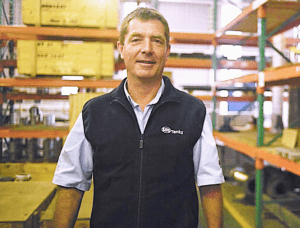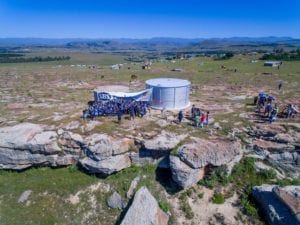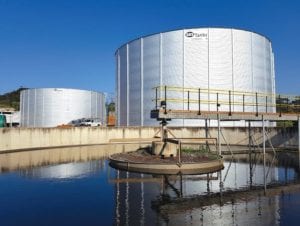Meeting the current and future water storage needs of South Africa’s rural and urban communities is a top priority, as is implementing future drought countermeasures. Delayne Gray, managing director at SBS Tanks®, discusses the company’s innovative responses to these and other challenges.
SBS Tanks’ current strategy for the municipal market is to ensure that every municipality understands the advantages of the SBS product line as a flexible solution. The company offers a turnkey package that brings true value to the end user.“Our tanks have been engineered to last well beyond 60 years, with minimal maintenance. This means that municipal budgets are responsibly spent,” Gray explains, adding that this doesn’t apply only to South Africa. SBS exports globally and has an expanding presence in key public and private sector markets that include the USA.
Tank applications
 Mining is one of the most aggressive environments and puts any product to the test. SBS’s tanks meet the most exacting requirements in this area and that means that the company’s products are field-proven for virtually every other application. SBS’s liners, which form an integral part of the tank system design, range from normal potable requirements to leachate and wastewater applications.
SBS’s tanks have also been widely used in the waste management industry, because they can store leachate from dump run-offs and other waste management sites, assisting in the client’s requirements for odour control.
Mining is one of the most aggressive environments and puts any product to the test. SBS’s tanks meet the most exacting requirements in this area and that means that the company’s products are field-proven for virtually every other application. SBS’s liners, which form an integral part of the tank system design, range from normal potable requirements to leachate and wastewater applications.
SBS’s tanks have also been widely used in the waste management industry, because they can store leachate from dump run-offs and other waste management sites, assisting in the client’s requirements for odour control.
Public sector offering
For the public sector, SBS specialises in containing brackish water or wastewater for further processing. One of the company’s flagship wastewater projects is an ongoing relationship with Sembcorp Siza Water in Ballito, KwaZulu-Natal. Sembcorp extracts water from two sources: the local river system and wastewater that has been processed. In November 2016, SBS provided a1 Mℓ temporary storage solution to meet Sembcorp’s requirements over the December season. This followed a major tank failure on a non-SBS tank. Sembcorp sells its potable water to the local municipalities, so the implications were severe. SBS replaced the failed tank with a 1 Mℓ SBS unit in just four days, and then installed additional 2 Mℓ and 3.3 Mℓ tanks, as per client requirements.
Storage for communities
“We advise on the best outcome for communities,” says Gray. “Sometimes, this solution involves the interconnection of our tanks with existing supplies. At other times, it’s a stand-alone installation for rural communities outside the municipal grid.“Often, the initial enquiry by municipalities is the starting point for a proactive discussion that ends with the final best outcome, after exploring all the other alternatives. Here, we pride ourselves on providing objective professional advice based on our value-engineering philosophy.”SBS’s goal is to lower the cost for municipalities. Examples include the optimisation of gravity-fed systems to reduce pump station and pipeline installation requirements. As part of this process, multiple smaller tanks can also be installed at higher elevations.
To achieve these cost reductions, SBS provides site assessment services to assist municipalities and consulting engineers with the best tank system location and layout. SBS also runs a series of annual roadshows at municipalities, which are also attended by contractors and consultants.
The smallest tank is 12 kℓ (12 000 litres); however, because they’re modular, the capacity can be incrementally expanded. “In other words, we can customise the volume, scalable up to a 3.3 Mℓ capacity, given available construction footprints,” he explains.Steel vs concrete
In terms of cost impact and time, steel tanks are far faster to build when compared to concrete reservoirs, without compromising capacity. A 3 Mℓ concrete reservoir would typically take around 18 months to complete; an SBS installation of the same capacity could be commissioned in about 40 days. When it comes to municipal strategy, this is obviously a highly persuasive argument and SBS constantly reinforces the benefits through national workshops. “On another note, SBS is often appointed to remediate concrete reservoirs that experience major leakages. Here, we install the same PVC liner we employ in our own tanks,” Gray continues.Rural solutions
 Many of SBS’s municipal projects are incremental and ongoing. Examples include the Sol Plaatje District in Kimberley, as well as Aliwal North, both in the Northern Cape. At Sol Plaatje, SBS’s installations comprise two 2.5 Mℓ tanks for potable water supply via municipal reticulation.
Many of SBS’s municipal projects are incremental and ongoing. Examples include the Sol Plaatje District in Kimberley, as well as Aliwal North, both in the Northern Cape. At Sol Plaatje, SBS’s installations comprise two 2.5 Mℓ tanks for potable water supply via municipal reticulation.
“As for solutions aimed at informal settlements, SBS Tanks is engaged with municipalities and they are aware of what we can do. After many successful installations, we’re positive that further opportunities will be forthcoming,” says Gray. “There are definite benefits for community projects.”Powered by solar or grid supply,
these systems can also be metered via telematics that record elements like consumption, inflow, outflow, level and even water temperature.
Rainwater harvesting
SBS is especially proud of the meaningful impact its tanks make when used for rainwater harvesting and has a system in place at its Pinetown facility. As Gray points out, the solution is highly sustainable and he believes that every building – public or private – should have a rainwater harvesting system in place. So far, SBS has installed systems at a number of companies and schools in KwaZulu-Natal, where substantial savings have been achieved by using these tanks for toilet flushing and other offline applications.Future opportunities
While the ongoing drought has unfortunately taken its toll on the country, it has opened up a number of opportunities for water storage. Desalination, for instance, whether for seawater or inland brackish water, is now a definite consideration, despite its relatively high cost compared to conventional treatment. Cities like Cape Town have already started desalination projects as a critical drought intervention. That presents opportunities for steel tank reservoirs (for before and after treatment), especially given their speed of installation.“At SBS Tanks, we have a vision of seeing our tanks filled; working and delivering water to all communities in need of reliable stored water. Making that happen comes down to building lasting partnerships with our public and private sector stakeholders. For SBS, we are proud to say that we deliver in terms of local and international quality standards and specifications,” Gray concludes.






